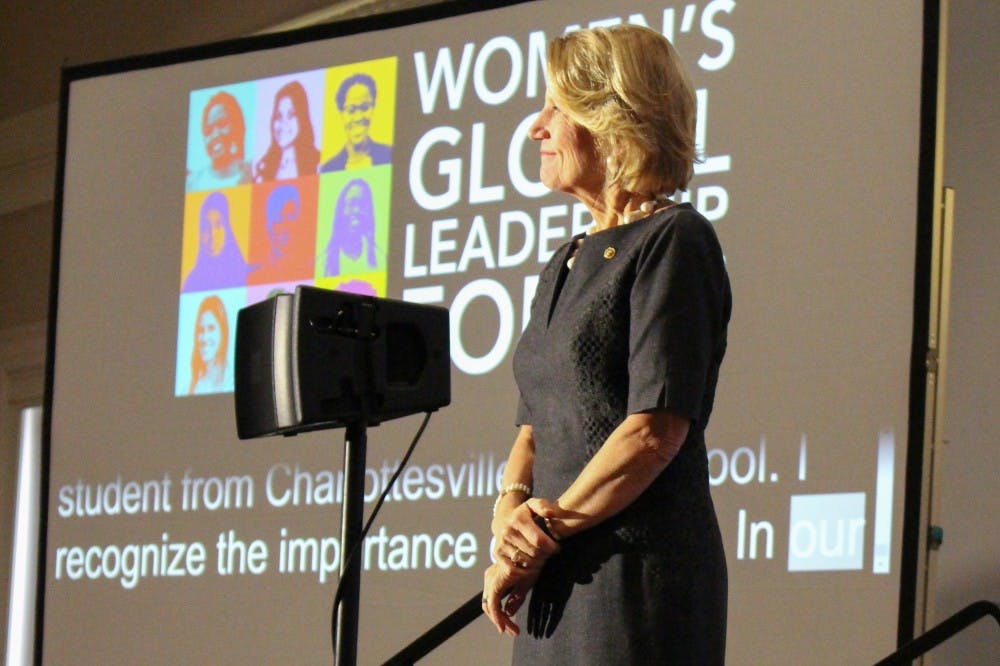The Women’s Global Leadership Forum kicked off Monday morning with a keynote address from U.S. Sen. Shelley Moore Capito (R-W.Va.), which focused on the role of women in 21st century democracy.
The Women’s Forum is part of the University’s Bicentennial celebration and hosted by the University’s Morven Programs. Student Council President and fourth-year College student Sarah Kenny introduced Capito after a brief welcome by Stewart Gamage, chair of the WGLF Steering Committee and director of Morven Programs, and University Vice Rector and Presidential Precinct founder James Murray Jr.
Capito spoke about her own experiences in public service and highlighted the importance of listening to enable impactful speaking.
“Humility and an open mind are a powerful tandem,” Capito said to an audience of about 200 in Newcomb Ballroom. “I think we speak more forcefully when we listen first.”
Capito used examples from tackling opioid addiction in her state and promoting accountability for sexual assault on campuses to illustrate the necessity of listening in strong leadership and public service.
“I was initially against [a needle exchange program], but local leaders presented their case, and they really opened my mind because I listened to what they were saying,” Capito said. “We now have eight programs in the state. It brings people into the health system. We are listening to one another to find a better way to serve people who are addicted.”
Capito closed her address by calling on women leaders to cultivate a collaborative, listen-first approach to leadership, as she said it is the future of bipartisanship and constructive progress.
“You have to challenge yourself to listen to colleagues and people that you don't agree with,” Capito said. “The role of the 21st century woman is selflessness over selfishness and achieving results, reaching across the aisle. Sitting on the side and waiting for others to do it is not an option.”
Audience members then had the opportunity to ask Capito questions. An international guest, who identified herself as Catherine from Johannesburg, asked Capito what concerns her about the future of democracy.
Capito warned against the tendency to tune out discourse and only listen to similar opinions, as it damages the democratic process.
“What is dangerous is people taking the clicker and turning the debate off because it's too hard. You find yourself either shutting down or cheerleading opinions, which reinforces our own prejudices,” Capito said. “This has bled through our political discourse and made it difficult to address the myriad of challenges that face us.”
A Charlottesville High School student asked Capito how women can amplify their voices without stooping to divisive rhetoric. Capito emphasized the push to involve more women in leadership and said often it's a matter of inserting oneself into the arena and not being afraid to fail and get back up.
Second-year Darden student Anisa Mechler said she was excited to attend the event and consider these big questions facing women leaders with others.
“It’s a really interesting time to be a woman, and Darden talks a lot about what it means to be a leader,” Mechler said. “I’ve been thinking a lot about how to lead in a world that sometimes struggles with gender, and how to still be true to myself as a woman and as a person, so I just think it's a great opportunity to think about it with other women.”
Third-year Doctor of Nursing Program student Kim Albero said Capito’s address was encouraging to her and was a good testament of effective leadership methods.
“I generally think of the current Republican leaders as often anti-women in their legislature and discussion or ignoring of women’s issues, so it was refreshing to hear someone with whom I don't necessarily agree with politically speak very clearly to points I absolutely agree with as a woman,” Albero said.
In an interview with The Cavalier Daily, Capito said she hopes her address sheds light on how women can be active and collaborative voices in democracy and leadership.
“Obviously I serve in a pretty exclusive club — women are way underrepresented. If we don’t have all the voices of the people that we are supposed to be representing at least in some fashion then we aren't able to be heard,” Capito said.
Additionally, Capito said the global aspect of the forum and diversity of speakers was important to promote women leadership globally.
“I think the global aspect of the conference is really interesting,” Capito said. “You’re going to have some international leaders who are going to talk about the differences in their countries and what’s worked for them.”
Kenny said this forum is the perfect collision of her passions, and she hopes that, with this forum, the University community will see how important female leadership is to everyone.
“I would hope that the entire community sees that women’s leadership affects them [and] that there are a number of challenges facing women who want to … have influence over the systems that govern us,” Kenny said. “And also that they can be part of the solution — no matter where you’re coming from or what you’re involved in — that we have a collective responsibility to make sure these voices are not only integrated, but also sought out in our community.”





